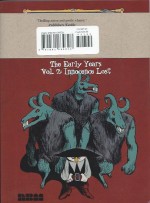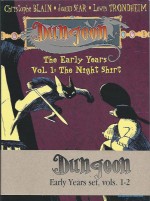

By Joann Sfar & Lewis Trondheim, art by Christophe Blain, translated by Joe Johnson (NBM)
Set ISBN: 978-1-56163-932-1
As crafted by prolific artisans Joann Sfar (Professeur Bell, Les olives noires, The Rabbi’s Cat) and Lewis Trondheim (La Mouche, Kaput and Zösky, Little Nothings) with assorted associates of their New Wave-ish collective of bande dessinée creators most often seen under the aegis of independent publisher L’Association, the Donjon saga has generated more than thirty interlinked volumes since it launched in 1998 and has become far more than a mere cult hit all over the world.
These slim, translated and re-released tomes form a small sub-division of a vastly generational, eccentrically raucous and addictively wacky franchise which melds starkly adult whimsy to the fantastic worlds of fantasy fiction, and the Early Years tomes (now available as a complete set) fill in some historical gaps which might have puzzled occasional readers of Dungeon Parade, Zenith, Monstres and Twilight.
There’s this magic castle, in a fantastic land of miracles, see, and it’s got a dungeon…
But before that citadel was constructed there was the debauched, bureaucratised and grimly frenetic urban hellhole of Antipolis, greatest and most appalling city on the strange world of Terra Amata…
Illustrated in compellingly frenetic style by Christophe Blain, it all begins with volume one and the origin of ‘The Night Shirt’. Young Hyacinthe De Cavalerre is the scion of an esteemed and noble – if provincial – house and line. The world is changing however; shifting from feudal aristocracy and blood-privilege to a civilisation based on mercantilism, greed and bureaucracy.
Thus a father dispatches his dreamy boy to the capital to study, residing with an estranged uncle to learn the rules of the New Age. The boy’s dreams of literary glory soon founder after an encounter with monstrous “Brutes†in the forest and are forever dashed when faced with the filth and unbridled avarice of the city…
At least he has made one friend: learned fellow traveller Doctor Hippolyte is also heading to Antipolis, determined to petition the city council to free a gigantic Arboress the municipality intends to burn alive as part of their upcoming carnival celebrations…
Literally negotiating their way into the fetid metropolis the travellers separate, and Hyacinthe makes his way to the mansion of wheelchair-bound Count Florotte and has a tense encounter with a serpentine – if mannish – seductress who teasingly offers to teach him how to use his sword.
His uncle calls her Alexandra; a valued – if occasional – employee…
Wearily settling in that night the young man is roused by screams and rushes to the aid of a serving girl being cruelly assaulted by an arrogant bully who boasts that no one will to come to her aid. When the boy intervenes he is casually rebuffed and shamefully leaves. The villain is Michael, his uncle’s most valued deputy and the one Hyacinthe has been indentured to…
Despondently returning to his room the boy then makes the acquaintance of the house elves as they busily steal his golden jacket buttons…
The next day Michael begins the fiscal and social education of his new charge, having Hyacinthe carry the huge bag of gold Florotte regularly dispenses for bribing officials to leave his various business enterprises alone. The lad is horrified to see the system used to throw Hippolyte in jail after failing to convince the town council to spare the captive tree-woman…
Michael celebrates by dragging the lad to an insalubrious tavern and getting plastered. The feline factotum knows Alexandra too…
After carrying the soused villain home, the furious, fanciful boy comes to a bizarre decision and returns to the dark streets, draped in a big blouse, waving his sword and wearing a mask…
More by luck than skill he breaks Hippolyte out of his noisome cell and the pair flee through the city. The flight is particularly easy as someone is killing all the guards and impediments in their path…
Soon they see Alexandra, dispatching more men, and the still-unnamed crusader gallantly rushes to her aid. She is more than a little charmed, even as she saves the neophyte from his own impetuous folly…
After she vanishes Hyacinthe attempts to get Hippolyte out of the city but the scholar refuses to leave without the Arboress. Forced to leave him hidden inside the gigantic tree-woman, the exhausted little hero staggers home and stumbles upon one of Michael’s more devilish schemes. The reprobate is taking gold from the elves to stop his own workers dynamiting the ground under Antipolis…
Some businessmen have plans to build a vast subway system beneath the city and have hired Blasters to blow up or expand the already in situ elf tunnels. Michael is taking cash from the little people to “stop†the project he’s actually expediting. He’s even crass enough to boast to Hyacinthe that they have over-paid him…
Scrupulously honest, the lad determines to return the extra gold but upon reaching the bowels of the city he accidentally causes a huge detonation which kills the Blasters, earning the undying devotion of the elves…
On reaching the house again he is horrified to find the mastermind behind the subway scheme is his own uncle and the elder doesn’t care how many suffer or die to accomplish his grand design…
Later as the Carnival begins, besotted Hyacinthe follows Alexandra and discovers what she does for Florotte: as the finest killer in the Guild of Assassins she is invaluable in his business dealings. When the heartbroken boy confronts her on the matter he painfully learns just how good she is at her job…
Battered and probably delirious, he determines to save her from herself and is astonished to find an army of elves awaiting him in his room. Blasters have returned in force and the wee folk have decided to abandon their underground homes for somewhere less busy…
Donning his commodious crime-busting costume, the lad chooses to do some good by saving Hippolyte and the Arboress. Accompanied by the elves he heads for the enclosure where the remarkably strong little people offer to carry the all-but-immobile tree-woman for their beloved “Nightshirtâ€. Soon, under cover of colossal carnival floats, the fugitives are heading for the wild woods surrounding the city…
After the carnage of a breakneck chase and unlikely triumph, Arboress and elves are invited to live in the castle of Hyacinthe’s father and a new story begins sometime later with the boy now a dutiful student attending the University of Antipolis.
When newcomer Alcibiades joins the class of prominent Dr. Fontaine, he is soon taken under the lad’s generous wing, experiencing the heady freedom of student life where Hyacinthe is the butt of the organ-juggling jokes of the Necromancy undergraduates. He regularly blows off steam prowling the dark streets, dishing out justice as the infamous urban legend The Night Shirt…
Utterly besotted with Alexandra, one night he spies on her and observes a passionate tryst with the vile Michael. Sadly the villain observes him back and a violent rooftop duel ensues…
Barely escaping with his life Hyacinthe heads home where his uncle has a favour to ask. Fontaine is a strenuous critic of Florotte’s proposed subway and, since a succession of “gifts†have not swayed the scientist’s opinions, perhaps the student might have a quiet word with his teacher?
The interview does not go well and despondent Hyacinthe opts to visit his father in the country rather than return to Florotte’s mansion. Enjoying the break, the lad lapses from unrequitable love of Alexandra and suffers a frustrating dalliance with a young lady named Elise. This leads to a violent battle between forest monsters and the Night Shirt…
Wounded and bleeding he is rescued by the elves who give him a pipe with magic tobaccos which temporarily impart a host of strange powers and abilities. When he returns to Antipolis, Fontaine has been murdered and Night Shirt has claimed responsibility…
Resolved to clear his alter ego’s name, things go quite badly for the boy until Alexandra deals herself in to save the little oaf from himself, but in the end justice is only served and the real killer exposed after sensible Elise takes over…
The saga continued in Volume 2: Innocence Lost as some time later future supreme Dungeon-Keeper Hyacinthe prowls the night as a far more effective masked vigilante. The Night Shirt’s nocturnal adventures are however seriously curtailed by his still-unrequited inamorata Alexandra.
Her violent disdain does not stop her from sharing her unbridled passions Рand a rather painful social disease Рwith the poor fool. Visiting old friend Dr. Hippolyte at the rapidly expanding country castle for advice (and possible medical solutions) he meets fair Gabrielle Olivet and offers to accompany her as she travels to join her fianc̩ in far-off Necroville.
However during a stopover in lawless, rabbit-infested frontier town Zedotamaxim, she is falsely arrested by over-officious sheriffs and trusts Hyacinthe to engineer her release by fetching her intended – prominent lawyer Eustace Ravin – from the wilds of the charnel hamlet…
Sadly once Hyacinthe gets there Eustace proves to be a rather faithless gadabout who couldn’t care less about Gabrielle’s plight. By the time he convinces the rogue of his duty it’s too late and she has been sold to the biggest brothel in Antipolis.
Determined to set things right The Night Shirt realises he’s going to need the assistance of the kind of people he usually fights…
Second story After the Rain is set many years later when aging and now dissolute Hyacinthe is a middle-aged, unhappily married roué. Set in his ways and terminally unhappy the former Night Shirt is enticed into making a comeback by clever and strangely superhuman Doctor Cormor who must battle greed and the establishment itself to stop completion of the infernal subway being dug through the unstable pile of detritus that forms the bedrock of the city.
Perhaps it is less a noble quest than the return of slinky Alexandra that fires up the weary hero, but when inevitable disaster strikes will Hyacinthe be ready or able to cope?
Featuring the catastrophic events which destroyed Antipolis and sparked the creation of the modern Dungeon of Terra Armata this is perhaps the most effective yarn in the franchise’s vast scope and span…
The inhabitants of this weirdly surreal universe include every kind of anthropomorphic beast and bug as well as monsters, demons, mean bunnies, sexy vamps and highly capable women-folk who know the true (lack of) worth of a man. This is an epic saga of cynically world-weary political intrigue, played as an eternal and highly amusing battle of the sexes, with tongues planted firmly in cheeks – and no, I won’t clarify or specify…
Comprising in total four translated French albums – ‘Donjon Potron-Minet: Le Chemisede la Nuit’, ‘Un Justicier dans L’Ennui, ‘Une Jeunesse Qui S’Enfuit’ and ‘Apres La Pluie’ – this baroque bunch of barbaric books comprise a delightfully absurd, earthy, sharp, poignant and brilliantly outlandish romp that’s a joy to read with vibrant, wildly eccentric art as moody as Dark Knight, as jolly as Rupert Bear and as anarchic as the best of Leo Baxendale.
Definitely for grown-ups with young hearts, Dungeon is a near-the-knuckle, illicit experience which addicts at first sight, but for fuller comprehension – and added enjoyment – I’d strongly advise buying all the various incarnations which are happily also currently available as collectors’ sets…
© 2001-2006, 2014 Delcourt Productions-Trondheim-Sfar-Blain. English translation © 2005 and 2009 NBM. All rights reserved.
